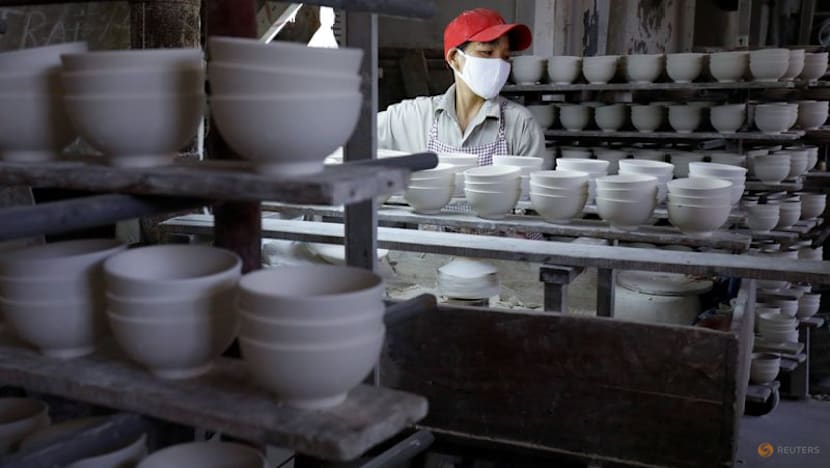Vietnam Communist Party targets faster growth for next five years amid challenges

A woman works on ceramic products at an assembly of Hai Duong ceramic factory in Hai Duong province, Vietnam on Jul 24, 2020. (File photo: REUTERS/Kham)
HANOI: Vietnam's ruling Communist Party is targeting faster annual economic growth over the next five years, despite potentially "severe" economic challenges, according to a draft document prepared for its upcoming congress.
The party expects the country's economy to grow by at least 10 per cent a year over the 2026 to 2030 period, according to the document released on Wednesday (Oct 15).
Vietnam targeted 6.5 per cent to 7.0 per cent annual growth over the 2021 to 2025 period. The economy expanded at an annual average of about 5.7 per cent in the 2021 to 2024 period, although growth is on track to be above 8 per cent this year.
The draft document sets the stage for discussions at the party congress, which will define the country's main strategies and policies for the coming five years. The congress, held every five years, is expected to take place after the parliament ends a legislative session in mid-December, but a precise date has still to be announced.
Officials are also aiming to lift gross domestic product per capita to US$8,500 by 2030, according to the document posted on the party's website, up from a target of US$4,700 to US$5,000 for the 2021 to 2025 period. It reached US$4,700 last year.
"Over the next five years, our country will face several difficulties and challenges, with some aspects expected to be harsher and more severe than the previous (five-year) period," the document said.
The export-reliant country faces 20 per cent tariffs on its exports to the United States, its main market.
Among other economic challenges, the party said Vietnam risked falling behind on technology, was experiencing "faster than forecast" population ageing and needed to confront risks from climate change, natural disasters and corruption.
The party aims to develop a new growth model in which the private economy is the "driving force" with the state taking the "leading role", the document said.
To boost growth and offset possibly declining revenues from trade, it also plans to increase public spending on infrastructure and other projects, with a budget deficit of about 5 per cent of GDP in the next five-year period, up from a range of 3.1 per cent to 3.2 per cent in 2021 to 2025.
Economists have said it has ample space to do so, thanks to a public debt below 35 per cent of GDP last year.
The document said the global situation was rapidly changing "in an unprecedentedly complex direction" with competition between major powers increasing. In a gloomy warning, it said "the risk of war is not excluded" for Vietnam.













